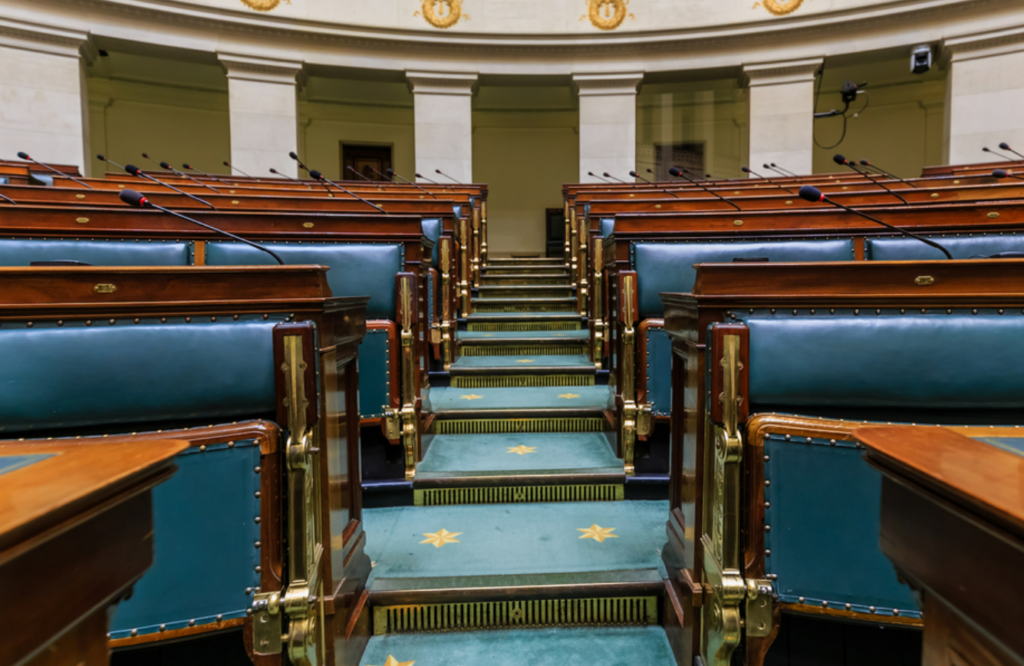Four small parties without elected officials – two in Flanders (Vista and Pro) and two in Wallonia (Oxygène and Collectif Citoyen) – are suing the Belgian State as they claim that the law on party financing has a discriminatory effect and unfairly favours established parties.
The summons was delivered to the Interior Affairs Ministry, which serves as a representative of the Belgian State, on Tuesday. The mini-parties, which do not have a seat in the federal or regional parliaments, said that the established major parties award themselves disproportionately high grants.
"A lot of tax money is spent improperly," Jan Wostyn of Vista told De Morgen. "This is self-service with money from the public treasury. The Belgian parties are the absolute top political advertisers on social media in Europe. They rent amusement parks just to organise members' days. This has little to do with democracy."
Wostyn went on to explain that smaller parties are discriminated against by Belgian law: "The grant is calculated per cast vote, but only for parties that win a seat in parliament. But that money is not at intended for operations in parliament, but rather for use outside of it. We do not get that chance."
Deafening silence
The Belgian chapter of the pan-European Volt party stressed its support for the four mini-parties' initiative to challenge the party financing system in court. "The Belgian political parties are among the richest in Europe and are among the absolute European top of big spenders on propaganda on social media. This promotes rigidity and unfair competition."
Various civil initiatives to reform the financing system have so far been unfruitful, the parties said in a press release. "There is a deafening silence about the agreements on reforming the system in the coalition agreement, occasional whispered support for reforms is only for the stage."
While public financing was once intended to strengthen parties against corruption, it has turned into "a perverse incentive to keep the bastion closed to newcomers," Volt said. "In addition to the exorbitant party financing, the legal and electoral thresholds do the rest to block innovation."
Tweet translation: "Belgian politics is a closed bastion, maintained by exorbitant party financing and electoral thresholds. That is why Volt supports the lawsuit from Vista, Pro, Oxygène and Collectif Citoyen."
The four mini-parties also denounced the electoral threshold system, particularly with the difference between Dutch-speaking and French-speaking constituencies. As the French-speaking ones are smaller, the actual electoral threshold is higher than the legal 5% – putting smaller French-speaking parties at a disadvantage.
Additionally, allowing contributions from elected officials also has a discriminatory effect, Wostyn said. "An ordinary citizen is only allowed to donate €500 to a party, but donations from elected officials do not count. These are suddenly called 'remittances'. This entitles parties such as the PVDA-PTB to a source of income that we do not receive."
The radical-left PVDA-PTB party policy dictates that its MPs can live on a net salary of about €2,000 per month – the rest of their wages go to the party's treasury. These remittances gave them an income of €2.67 million in 2021 – more than any other party in Belgium.
Related News
- Belgian political parties spending €4.9 million in adverts could set new record
- Vlaams Belang breaks political ad spending record ahead of Flanders Day
- Big spenders: Flemish political parties spend €2.5 million on advertising
"Public financing is intended for democracy, not particracy and self-enrichment," said Volt. "Democracy benefits from a vibrant party landscape and involved and active citizens, where the established parties are always challenged by newcomers, but in particracy the incumbent parties have shielded themselves from competition."
The complaint will now be brought before the Brussels court, with the parties hoping that the judge will ask the Constitutional Court a preliminary question about possible unconstitutional discrimination. A ruling on the merits will only come after the elections.
Still, Wostyn is hopeful: "The major parties agree with us, they say again and again. But nothing happens. Apparently, the urge to maintain one's own advantage is too great. We would have preferred not to go to court, but since the parties in parliament do nothing, we have no other choice.”
The annual party donations, all together, are estimated at more than €75 million.

